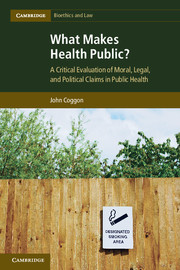 What Makes Health Public?
What Makes Health Public? Part II - Evaluating evaluations: making health public
Published online by Cambridge University Press: 05 June 2012
Summary
Introduction to Part II
In Part II my focus is on the nature of analysis in a political sphere, and the views that have been presented by other theorists working in public health law and ethics. I do not aim or claim to offer a comprehensive presentation. Rather, I hope to offer a good representation of the array of arguments that can be found in this area of policy and academic study. My analysis works in part as a hint to a broader depiction of accounts in public health law and ethics, in part as a means to demonstrate quite how wide-ranging and fundamentally opposing distinct accounts can be, in part to show what they share, and primarily as a device to allow the reader to contextualise politically these and other arguments about public health issues. By focusing on the political aspects of the questions, we bring to the fore the nature of and need for a relevantly all things considered approach to policy questions, drawing out the germane normative concerns and the important competing issues that sit alongside health matters, which may be obscured if our focus is narrowed by a central endeavour in public health. In other words, my approach allows us to study public health without losing sight of the other things that matter in human society. My purposes in this Part are twofold. First, in Chapter 7, I present the basis for recognising that our concern is necessarily political. Second, in both Chapters 7 and 8, I consider key arguments from the broad range of ideas that underpin approaches to politics and policy, allowing us to understand why disagreement is so profound, and why overcoming it may prove so difficult, especially if moral consensus is thought necessary.
- Type
- Chapter
- Information
- What Makes Health Public?A Critical Evaluation of Moral, Legal, and Political Claims in Public Health, pp. 97 - 98Publisher: Cambridge University PressPrint publication year: 2012
